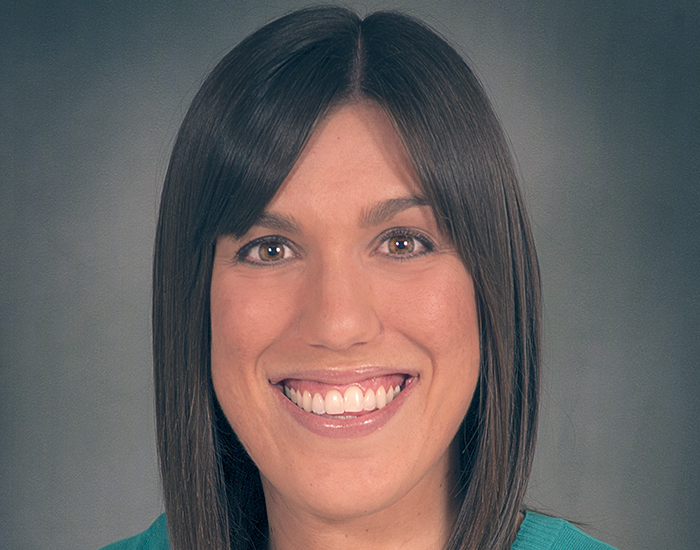Within Occupational Therapy (OT) programs, the doctoral capstone is still a relatively new aspect of OT education. Thus, as Capstone Coordinator and Assistant Professor for Keck Graduate Institute (KGI)'s forthcoming Occupational Therapy Doctorate (OTD) program, Dr. Danielle Friberg is educating the academic community and OT professionals on the benefits of a capstone. This includes in terms of skills that it provides for students and increased awareness for the general public about what OTs do.
To this end, Friberg has two upcoming presentations—“An Exploration of Doctoral Capstone Outcomes'' and "The Doctoral Capstone: Creating Opportunities for Mutual Partnerships”— at the American Occupational Therapy Association (AOTA)’s Education Summit and the Occupational Therapy Association of California’s Annual Conference and Expo, respectively. Additionally, her publication “An Exploration of the Occupational Therapy Doctoral Capstone: Perspectives from Capstone Coordinators, Graduates, and Site Mentors” was recently accepted by the Journal of Occupational Therapy Education.
Friberg has also collaborated with Capstone Coordinators from other universities to address some of the gaps in knowledge, participating in various committees through the AOTA.
The Occupational Therapy doctoral capstone provides an opportunity for students to develop as innovative leaders and scholars of practice by demonstrating in-depth synthesis and application of knowledge within an area of focus in a mentored setting. It consists of two components: the capstone project and the doctoral capstone experience (DCE).
With the assistance of a faculty mentor, students choose one of the following areas of focus: clinical practice skills, research, program and policy development, leadership, advocacy, administration, education, and theory development. After taking a series of capstone classes, the students create a plan and undergo the DCE, which involves implementing these skills over 14 weeks on-site with a community partner. Such partners could include hospitals, clinics, schools, and community programs.
For example, suppose a student's focus was program development. In that case, they might develop an occupation-based program to meet clients' needs in community-based programs for individuals with mental health diagnoses. For education, a potential project could be developing a curriculum for a course in KGI's OTD program.
"The goal of the capstone is to complete a scholarly deliverable that not only demonstrates the student's application of OT knowledge but also benefits the site," Friberg said. "Also, besides advancing students' skills within an area of focus and giving them more in-depth exposure, another huge goal is for them to disseminate their work beyond the KGI community."
To this end, faculty will help students submit their work to professional conferences, academic journals, and magazines. This will empower them to advance their careers as well as share their projects with a broader audience.
Friberg's clinical background is in pediatrics. After teaching as an adjunct professor at the University of Utah, she became Capstone Coordinator for West Coast University upon moving to Los Angeles.
"Over the last several years, there has been a lot of discourse about the OT profession moving towards an entry-level doctorate and, as such, there have been more OTD programs opening across the country," Friberg said. "But that said, there are still only a handful of fully accredited programs in the U.S."
Thus, at West Coast University, Friberg's role was to chart a path for the program, helping to define precisely what a capstone entails and how to utilize it to help students meet their learning outcomes. She joined KGI's faculty as the OTD Capstone Coordinator at the beginning of May and has been working with OTD Founding Program Director Dr. Christy Billock, Academic Fieldwork Coordinator Dr. Rachelle Murphy, and Assistant Professor Dr. Amy Sadek to develop the program's curriculum.
"The work I'm doing at KGI now is similar to what I did at West Coast University, but I'm coming at it with a fresh perspective," Friberg said.
"Our OT program at KGI is really unique, with a strong emphasis on community-based practice and preparing students to practice occupational therapy in a wide variety of settings, including emerging settings where there is not currently an OT presence."
"The capstone will provide an opportunity for our students to be agents of change in the community and trailblazers on a larger scale as they contribute to the expansion of our profession."
Friberg is excited to continue developing the curriculum for the upcoming academic year and see it come to life. Currently, she is meeting with sites in the community and building close relationships and trusted partnerships.
"The American OT Association has a Vision 2025 statement, and it really is a guide for how occupational therapists should be thinking about their work," Friberg said. "It focuses on how we can be effective problem solvers, advocate for accessibility, and promote diversity, equity, and inclusion. I'm excited to see how we at KGI can use our capstones to contribute to Vision 2025 and prepare the next generation of practitioners."
Billock shares Friberg's excitement for what can be achieved in KGI's OTD capstone program.
"We are grateful to have Dr. Friberg’s expertise on the OTD capstone process here at KGI," Billock said. "Her thoughtful and pioneering work on the nuances of capstone procedures, scholarship, and placement for new and developing OTD programs will lead to meaningful learning opportunities and professional growth for KGI’s future OTD students."
